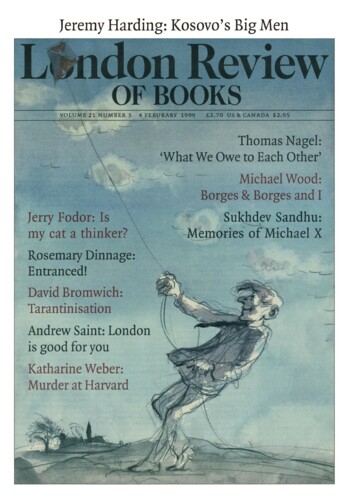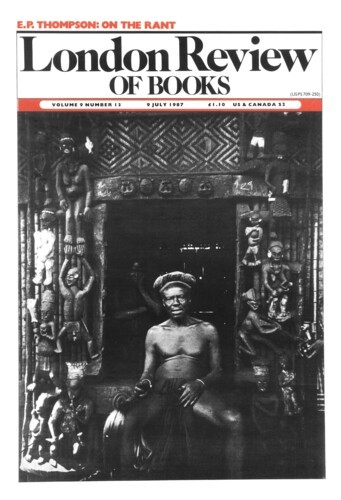Terence Ranger
Terence Ranger is a social historian of Africa and a visiting professor at the University of Zimbabwe.
To Fiji with Measles: plagues
Terence Ranger, 4 February 1999
So-called World History originated in an attempt to escape from the tyrannical perspective of dead white Euro-American males, yet that ‘world’ perspective has had the effect of making those same males more dominant than ever. Thus Eric Wolf’s Europe and the People Without History (1982), however heroic in intention, ends up asserting that extra-European peoples did have a history, but it was a history of their relations with Euro-American economies. In his Age of Extremes, Eric Hobsbawm expresses his contempt for the historians who deny a past to Africa or Asia, but himself provides an account which gives all the agency to Europe.‘
Dark Corners
Terence Ranger, 9 July 1987
The publishers of each of these books claim a revelation of common experience and suffering through the true recounting of an individual life. Harriet Jacobs’s Incidents in the Life of a Slave Girl, Written by Herself was first published anonymously in 1861. The dust-jacket of this new edition hails it both as a true life-story and as a classic expression of ‘the Afro-American experience’. Edith Turner’s The Spirit and the Drum, which recounts her visits to western Zambia with her husband Victor a century later than Jacobs’s misadventures in America, is described as ‘a highly personal memoir’ which ‘re-creates the ritual and ceremonial life of the Ndembu people’. Mark Mathabane’s autobiographical Kaffir Boy, which describes growing up in Alexandra township near Johannesburg between 1960 and 1978, is offered both as ‘a unique and remarkable memoir’ and as a revelation of ‘how a black and his family suffer the daily reality’ of the system of Apartheid. Yet each raises questions concerning their representativeness, their literalness and their significance.
Pieces about Terence Ranger in the LRB
Zero Grazing
John Ryle, 5 November 1992
Seventy-four years ago a viral pandemic began in America, most likely on a pig farm in Iowa. Fifteen months later it had killed over eighteen million people, 1 per cent of the world’s...
The Road to Independence
David Caute, 21 November 1985
Terence Ranger’s major new exploration of Zimbabwean peasant politics spans the ninety years from the early colonial period to the 1980s. While drawing heavily on his own intensive research...
Pastiche
Norman Stone, 21 July 1983
One of Arnold Toynbee’s Laws was that, in any civilisation, mannered imitation of the past was a Bad Thing: he chose the Poles’ decision to reconstruct the Old City of Warsaw after...
Read anywhere with the London Review of Books app, available now from the App Store for Apple devices, Google Play for Android devices and Amazon for your Kindle Fire.
Sign up to our newsletter
For highlights from the latest issue, our archive and the blog, as well as news, events and exclusive promotions.



